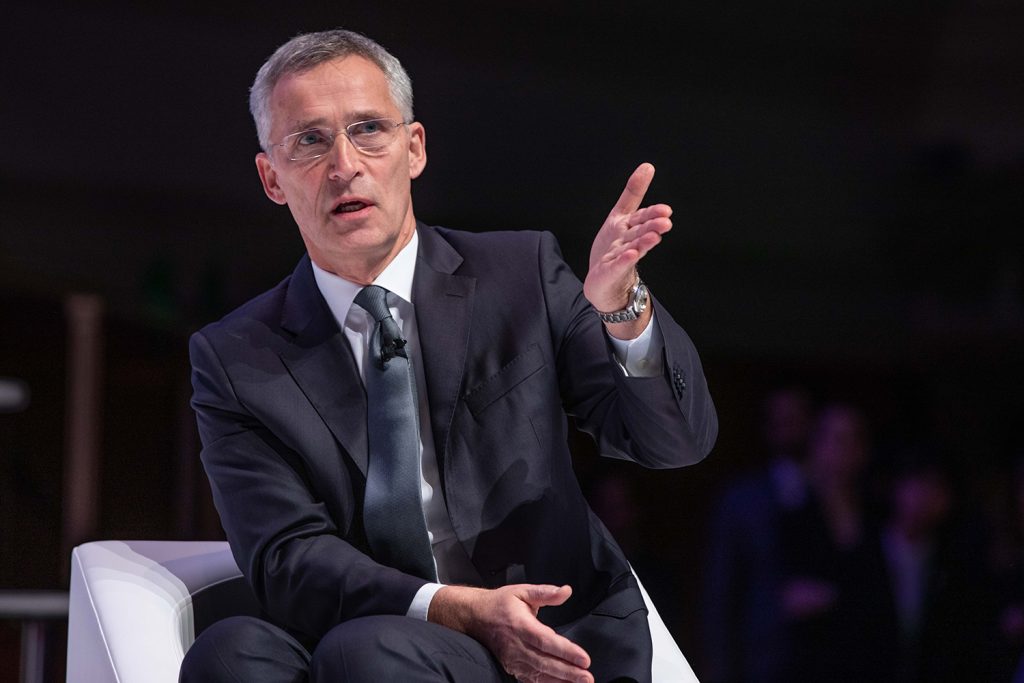
NATO Secretary General Jens Stoltenberg speaks at the NATO Engages event in London, United Kingdom on December 3, 2019. (Sarah Halls)
When French President Emmanuel Macron warned of “the
brain death of NATO” last month, it was widely seen as yet another damaging
public rift for the Alliance. But NATO Secretary General Jens Stoltenberg had a
clear message on December 3, one day before NATO leaders meet in London:
actions speak louder than words.
“When you look at NATO, you see that we are actually
delivering,” Stoltenberg said at the NATO Engages — London 2019 event, cohosted by the
Atlantic Council. “For the first time in our history, we have combat-ready
troops in the eastern part of the Alliance,” he continued. “We have tripled the
size of the NATO Response Force—we are able to reinforce if needed. We invest
in high-end capabilities, we step up in the fight against terrorism, in the new
training mission in Iraq, and European allies are investing more in defense. So
if you just look at the substance, you can see that this Alliance is
delivering.”
Macron’s remarks are not the only NATO disagreement
currently in the public eye. Earlier on December 3, Turkish President Recep
Tayyip Erdoğan demanded that NATO “recognize as terrorist organizations those
we consider terrorist organizations” and threatened to block the Alliance’s plans for an
expanded defense of the Baltics over the issue.
The BBC’s Lyse Doucet, who moderated the conversation with
Stoltenberg, pressed the secretary general about whether “NATO’s credibility
has been dented by these very public rows about even your founding principle—all
for one and one for all.” But Stoltenberg cast such disagreements as part of
the normal give and take of the Alliance rather than evidence of a breakdown.
“It would be strange if twenty-nine allies with different
political parties, different history, different geography, always agreed on
everything,” he said. “But the lesson we have learned from history is that
despite these differences we have always been able to unite around our core
policy to protect and defend each other.”
And while Stoltenberg could not guarantee that NATO leaders
would leave the meetings having assuaged Turkey’s demands, he stressed that the
bloc is committed to the security of the Baltic states regardless of the fate
of the Baltic expansion.
“It’s not like NATO doesn’t have a plan to defend the Baltic
countries,” he said. “We have a plan and, as I said, we have the forces and we
have the presence. I think that’s the strongest expression of our collective
defense, our commitment to NATO’s collective defense clause.”
Stoltenberg also touted the adaptability of the alliance in
the face of new threats. In response to a question about China, he noted that
NATO leaders will, for the first time, be discussing a collective response to
Beijing’s rise as a world power.
“This is not about moving NATO into the South China Sea, but
it’s about taking into account that China is coming closer to us—in the Arctic,
in Africa, investing heavily in our infrastructure in Europe, in cyberspace,”
he said.
And Stoltenberg welcomed rising levels of defense spending
across the Alliance. While NATO countries rightfully dropped their defense
budgets after the end of Cold War, he said, “we have to be able also to
increase defense spending when tensions are going up.” He noted that nine NATO
members now meet the alliance’s goal of 2 percent of gross domestic product for
defense spending and that “the majority of allies have plans in place to meet
two percent by 2024.”
Stoltenberg cautioned that NATO could do more to seek dialogue
with Russia and find ways to resurrect arms control after the death of the INF
Treaty. But he ended his talk on a positive note, saying that the bloc is ready
and willing to make whatever changes necessary.
“NATO is the most successful alliance in history because we have always been able to change,” he said. “And as long as we continue to change, we will continue to be the most successful alliance in history.”
Max J. Rosenthal is an editor with the Atlantic Council. Follow him on Twitter @Maxjrosenthal.
Further reading:
Tue, Dec 3, 2019
While international headlines have focused on high-profile disputes within the NATO alliance over a litany of issues including defense spending, trade, Syria, and Brexit, transatlantic leaders stressed on December 3 that these disagreements are dwarfed by the continued success of the seventy-year-old alliance.
New Atlanticist
by
David A. Wemer
Thu, Nov 14, 2019
Edward Ferguson, minister counsellor for defense at the Embassy of the United Kingdom in the United States, said that the Alliance is setting an ambitious agenda for the summit “to show that NATO as a septuagenarian is as fit and virile as ever and to highlight the progress we have made in adapting NATO’s deterrence and defense since the 2014 Wales Summit.”
New Atlanticist
by
David A. Wemer
Tue, Nov 12, 2019
Macron’s interview is not about NATO or the United States, but rather about Europe. His interview reflects deep worries that Europe is gradually being on the menu of global power politics and about the means to ensure that it is at the table instead.
New Atlanticist
by
Olivier-Rémy Bel
When French President Emmanuel Macron warned of “the brain death of NATO” last month, it was widely seen as yet another damaging public rift for the Alliance. But NATO Secretary General Jens Stoltenberg had a clear message on December 3, one day before NATO leaders meet in London: actions speak louder than words.
|